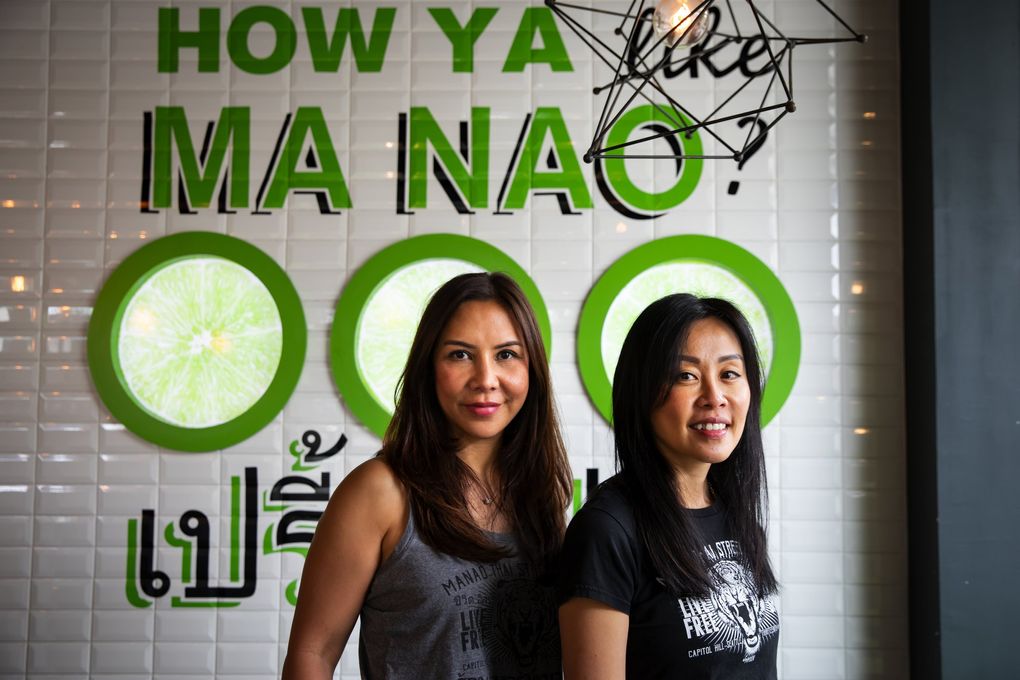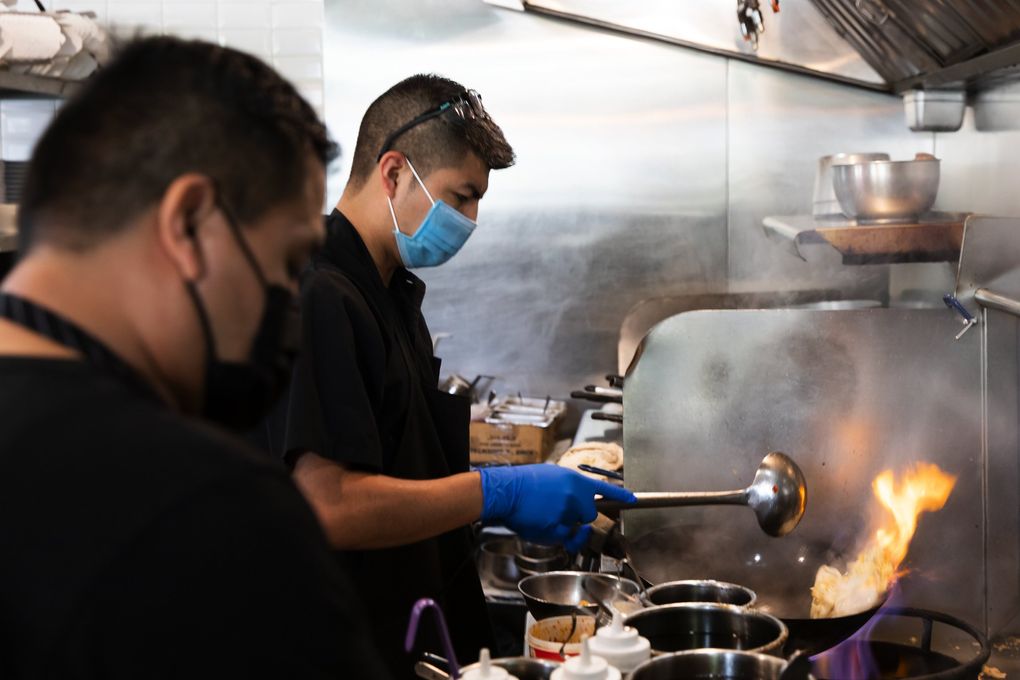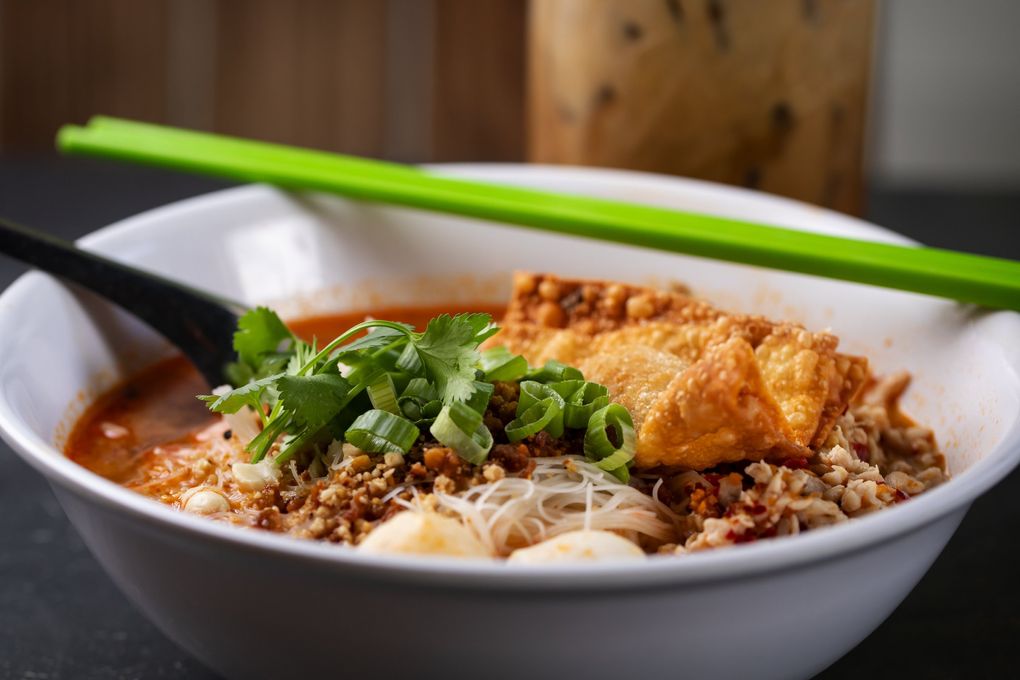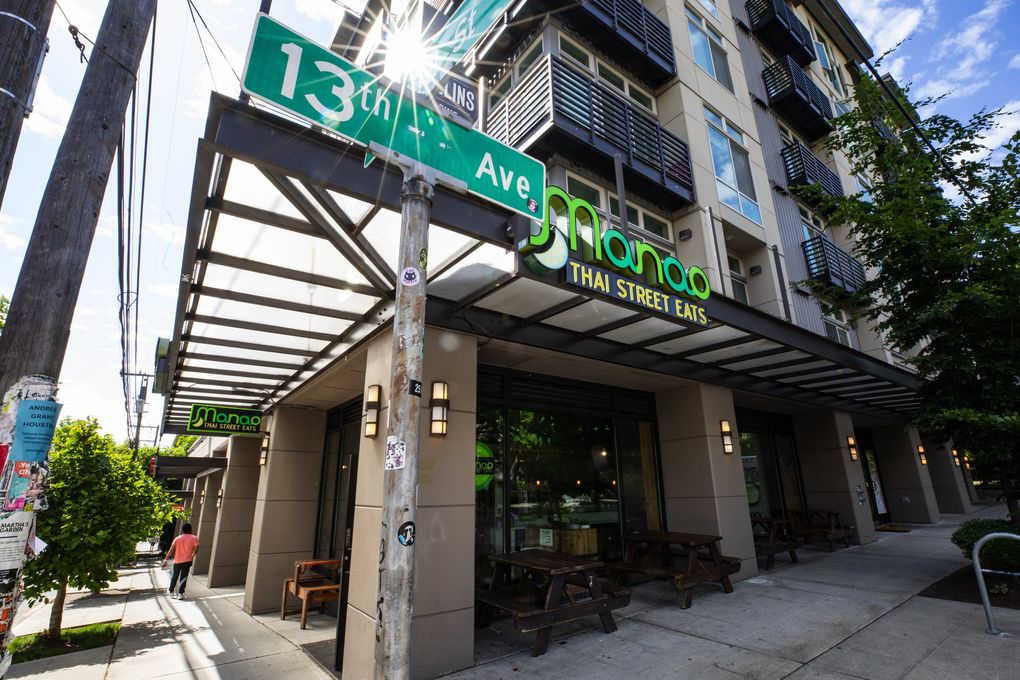Food critic Bethany Jean Clement gives thanks for her neighborhood Thai place
Seattle is home to countless Thai restaurants, and everybody who likes Thai food — and who doesn’t? — has their neighborhood favorite. Getting takeout is something taken for granted. You order the same thing every time, maybe with one or two variations, depending on mood or season. It’s easy weeknight eating, perhaps accompanied by Netflix, hitting pause to get seconds.
Then, in the middle of the pandemic, when “weeknight” had lost all meaning, both nothing and everything somehow seemed special. Just to be alive could feel like a lightning bolt of luck, while the sameness of shutdown days wove time into a Möbius strip of darkness and light. Eating sometimes got thrown haphazardly in, but also became one of life’s few remaining punctuation marks.
One evening marooned among innumerable indistinguishable evenings, it seemed as good a time as any for Manao Thai. The person who answered the phone called me “honey,” a tiny moment of casual human kindness that might’ve escaped notice before. The interaction across the counter 15 minutes later felt similarly familial, despite two masks and a sheet of plexiglass between us. Back home in moments, here was good old phad see ew — but with such supple, tender rice noodles, like little irregular blankets all savory-sweet and smoky with wok-sear. And did they always use Chinese broccoli, still bright green, with bits of stem included for extra crunchiness? The papaya salad, so tangy and bright, came with spiral-scored carrot sticks, whole green beans and a tinfoil-wrapped cake of sticky pandan-leaf rice, like it was put together by an especially awesome mom. Garlic green beans seemed supercharged with flavor.
It shouldn’t take a global pandemic to prompt a profound sense of gratitude for the place that’s always been there, right down the street, caring for you with unseen hands. How had I not realized how lucky I was? Note to self: Give thanks.

Fast-forward to midafternoon last Tuesday. Meeting co-owners Teeraya Silpi and Montida Lertkiatsakul at one of Manao’s sidewalk picnic tables, we all ascertain we’re vaccinated and joyfully unmask. The two of them interrupt each other as they try to figure out how long ago they met waiting tables at a Thai restaurant in Bothell. “We’ve been friends, oh my gosh, like —” Lertkiatsakul says. “Forever!” Silpi says. Fifteen years? They don’t know. “How old we are!” Silpi says, and they laugh.
Both came to the States, separately, from Bangkok, for college. Back in Thailand, one of Lertkiatsakul’s aunts ran a restaurant, another a bakery; Silpi says she learned to cook from her mother, “but I don’t think I’m quite as good as her.” At the Bothell restaurant, they each noticed how hard the other one worked — six and a half days a week, and they would’ve worked seven, if the place had stayed open those extra hours. (They laugh again.) They shared a love of talking to customers, of both eating and serving food. Each went on to be part-owner of a different Thai restaurant before deciding to join forces on Manao, their only place now.

Lertkiatsakul and Silpi take pride in keeping the prices reasonable, and while Manao is counter-service, the interior’s got stylish accents in the green of the lime from which it takes its Thai name. They call their menu comfort food, and they’ve got regulars who come multiple times a week, sometimes wearing pajamas (more laughing, not at all unkind). “Here, you can be more casual,” Silpi says. “You can be comfortable to be by yourself, as well,” she notes, as opposed to fancier spots where a solo diner might feel awkward. The firefighters from Capitol Hill’s Station 25 across the street come in sometimes, and if they have to run, they get fresh dishes made for them again upon their return.
Out of all the different Bangkok street foods they serve, the curries, the many vegetarian dishes, the pork belly, it turns out Lertkiatsakul and Silpi’s favorites are mostly the same as mine: the phad see ew, phad Thai and the papaya salad. Their rice noodles are better than most, they confirm, because they get them fresh every single day. Chinese broccoli costs more, but it’s authentic and tastes better; same with using chives instead of substituting green onion; tamarind sauce, not ketchup. Better rice is another greater expense, but it’s worth it — higher quality makes people happy in ways they might not even realize.
“It’s not because it’s our restaurant,” Lertkiatsakul says, “but I wouldn’t eat phad Thai anywhere else but here.” “Me, too,” Silpi adds.

Lertkiatsakul also especially loves the spicy noodle soup — a street food classic, she explains. “Even though Thailand is hot and humid, people love noodle soup,” she says. This one’s got a nest of very thin rice noodles, spicy ground chicken, bouncy fish balls, crunchy-browned fried garlic bits, a golden-fried triangle of wonton on top. The chicken broth, Lertkiatsakul says, has “like a sweet and sour flavor — a bit salty — limey — like everything combined. I could eat it every day … I cook it at home, I come here, I still eat it.”
The next afternoon, I’m one of the solo diners, sitting at the same picnic table. It’s 81 degrees and a fire engine screams out of its berth as I start my soup. Despite a warning of neon-orange oil around the edges of the bowl, the spicy heat creeps rather than overwhelms. A few minutes later, nose running slightly, the hot day feels less so, while the mind’s aglow. Could eat every day, yes, thank you.
There’s so much more to tell about Manao. Lertkiatsakul and Silpi still work filling in every role, including washing dishes, while a lot of their staff have stayed with them since the beginning. “We’re like a family together,” Silpi says. They pay above minimum wage and always have. “We don’t think that’s too much at all,” she says. “They deserve it.”

The neighborhood stayed supportive throughout the pandemic, for which Lertkiatsakul and Silpi count themselves fortunate. Likewise, when last summer’s protests against police violence centered on Seattle’s East Precinct one block away, people from the CHOP became customers. Consulting with the staff about safety, they only closed Manao a handful of days. After some nearby businesses got windows smashed, Manao’s were boarded up for a couple of months, the normally airy space dark inside. Silpi’s plants died. But, she says, on the bright side, “The first day they take everything down — it’s like, you feel alive again!”
“We talked,” Silpi says, “If we survived last year … It’s like, you know what? We can do this.”
“Mmmm-hmm,” Lertkiatsakul says.
They’ll celebrate Manao’s eighth birthday in September as they celebrated the opening, with Buddhist monks offering a blessing, then a special family-style dinner party with regulars invited. They’re both practicing Buddhists, and when it comes to the restaurant, as with all things, that means, Silpi says, to treat others as you’d treat yourself.
Lertkiatsakul agrees. “Live peacefully and try to understand other people,” she says. Don’t forget to pay attention. Don’t stop giving thanks.
_______
Manao Thai Street Eats: 1222 E. Pine St., Seattle; 206-556-2964; manaothai.com







